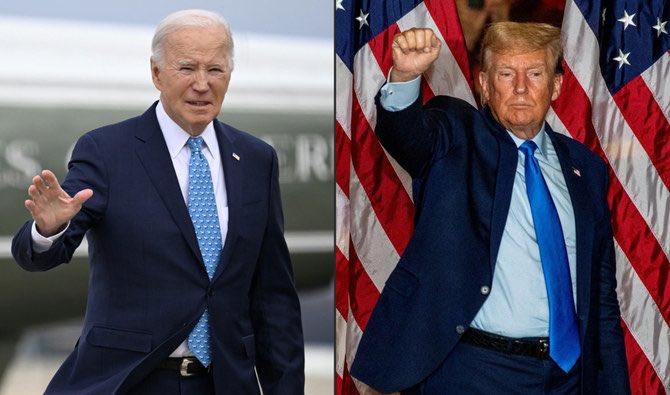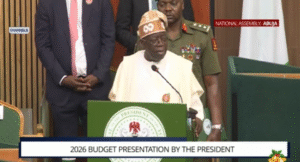
President Joe Biden and Donald Trump on Tuesday both secured their parties’ nominations for the presidency, formalising a general-election rematch that many voters dread but that had appeared virtually inevitable for months.
They both passed the delegate thresholds to clinch their parties’ nominations for the election in November, according to BBC.
Four states, one American territory and Democrats living abroad held their primaries on Tuesday.
The result means US voters face a rematch of the 2020 presidential election in eight months’ time.
Biden won a critical mass of delegates to the Democratic National Convention with a victory in Georgia, hours before Trump clinched the Republican delegates he needed with a victory in Washington state. The Associated Press quickly projected wins for both men in Georgia, Washington and Mississippi on Tuesday evening as Hawaii was also set to hold its GOP caucuses.
The general election is effectively well underway, with Trump and Biden sparring over immigration, the economy, abortion and each other’s fitness for office.
Biden’s State of the Union address last week resembled a campaign curtain-raiser as he sought to reassure voters about his age and reinvigorate swaths of the Democratic coalition that are not enthused about 2024.
Trump’s campaign this week took control of the Republican National Committee and fired dozens of staff as they sought to function as a single operation and catch up to Biden’s fundraising.
Biden is attacking Trump’s antiabortion record and disdain for many U.S. commitments abroad, and he is arguing that Trump poses a unique threat to American democracy after attempting to overturn the 2020 election.
“Donald Trump is running a campaign of resentment, revenge, and retribution that threatens the very idea of America,” Biden said in a statement Tuesday after winning the nomination.
Trump is capitalizing on voters’ disapproval of Biden and his handling of the economy and southern border — and he is preparing for his first trial in several pending criminal cases, which have rallied the GOP but could give swing voters pause.
“Our nation is failing. … We’re going to turn it around,” Trump said in a video posted to social media late Tuesday.
General elections typically draw much broader turnout than primaries, complicating efforts to draw lessons from Tuesday’s results for November.
But the vote in Georgia, a key swing state where both candidates campaigned Saturday, offered some clues to Trump’s and Biden’s political strengths and weaknesses.
Former U.N. ambassador Nikki Haley, who dropped out of the GOP primary last week, came closer to Trump in a couple of Atlanta-area counties where Democrats had big advantages in 2020.
But much of her support came before Tuesday. With an estimated 78 percent of the vote counted statewide Tuesday night, Haley had just 5 percent support among Election Day voters, compared with 21 percent among those who voted early.
Biden needed to win 1,968 delegates to Democrats’ convention this summer, while Trump needed to win 1,215 delegates to the Republican National Convention to lock down the nomination.
A large share of delegates were awarded last week on Super Tuesday, when 15 states voted at once.
After a primary race that took the candidates across the country to places including Iowa, South Carolina and California, the general election is expected to be waged largely in the battleground states of Pennsylvania, Michigan, Wisconsin, Georgia, Arizona and Nevada, with the possible addition of North Carolina. In 2020, Biden won six of those states, narrowly losing North Carolina to Trump.
Recent polling, however, has shown Trump leading in many of the battleground states, as well as nationally, as Biden faces low approval ratings.
“Biden’s biggest challenge is consolidation of the base,” Democratic strategist Joel Payne said. “Obviously, Biden is going to do a pretty robust outreach to moderates and Republicans — but the first thing he needs to do is consolidate his base.”
Biden has sought to frame the election as a choice between two vastly different presidents, hoping to make the race as much of a referendum on Trump as on himself. During the State of the Union address last week, Biden referred to “my predecessor” more than a dozen times as he criticized Trump on a range of issues including abortion, taxes, trade and health care.
Biden, 81, has recently addressed the issue of his age more directly, often reminding people that Trump is not much younger at 77. His campaign has also begun to amplify the contrast with Trump in television ads, launching a $30 million push last week.
Trump’s campaign long expected to clinch the GOP nomination by March 19 at the latest. His nomination seemed, to many, like a foregone conclusion since the Jan. 15 caucuses in Iowa, which kicked off the nominating process and crushed competitors’ hopes by delivering Trump a 30-point landslide.






